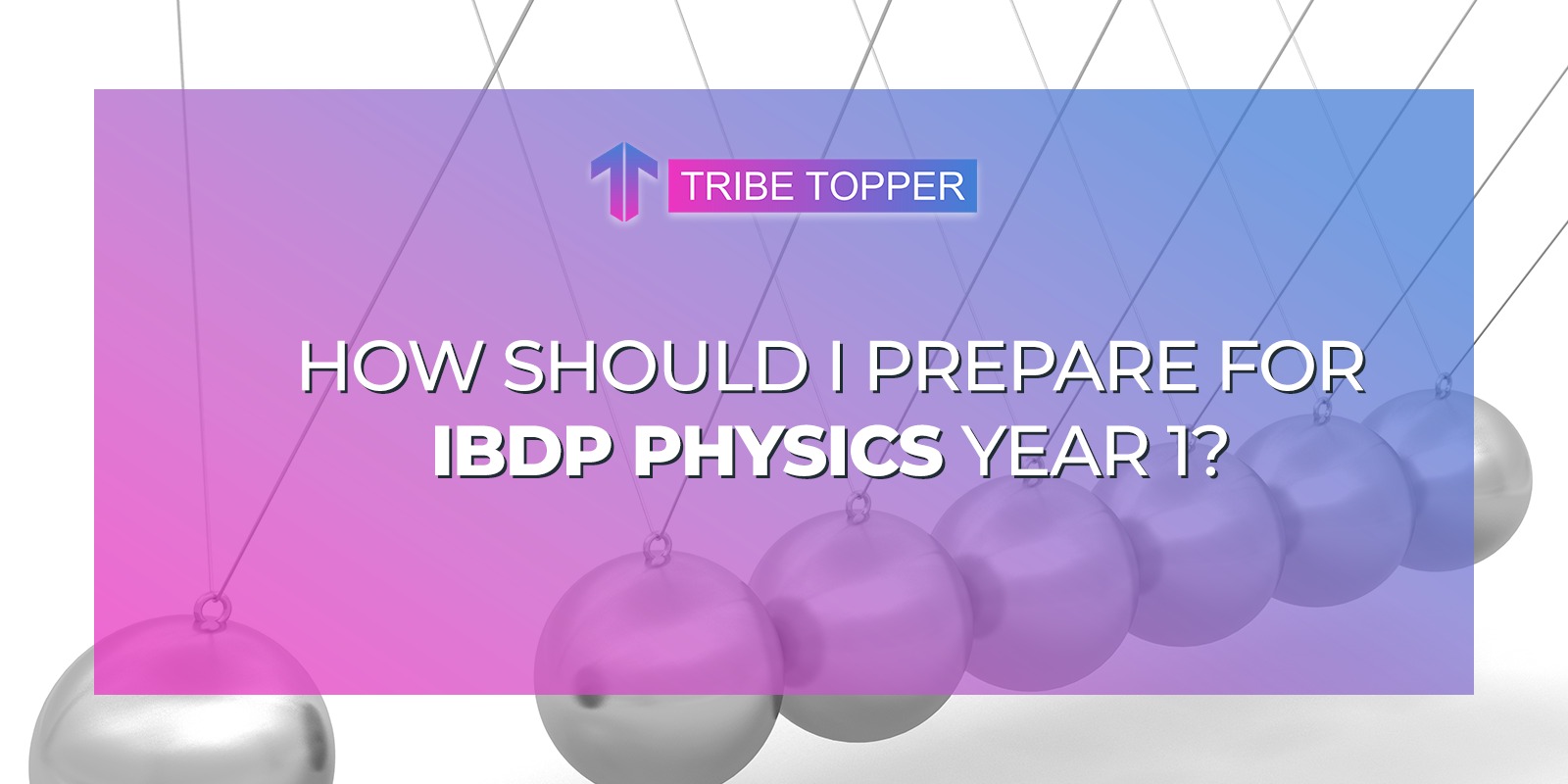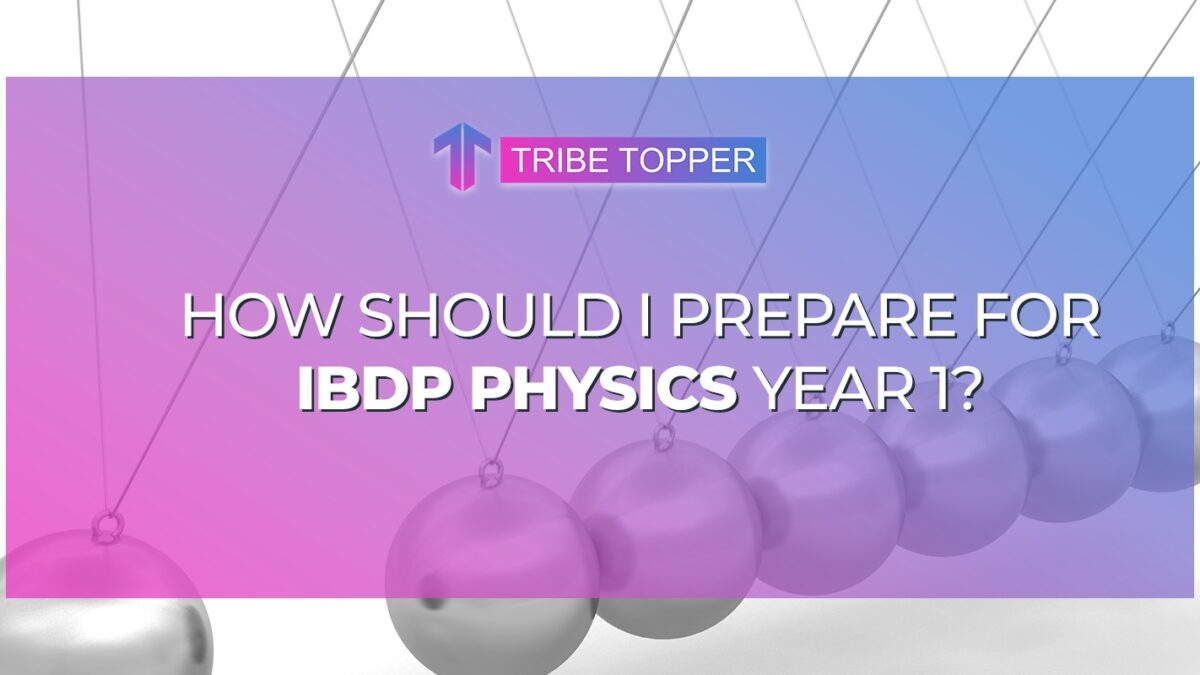How should I prepare for IBDP physics year 1?
It can be overwhelming to realize that this subject is so different from what we learned in our high school classes as your first year of IB physics progresses. When you have six topics going at once (I’m not lying), and mountains of homework stacking up on your desk every night, everything changes.
So, how do you deal with the chaos?
Firstly, don’t be alarmed.
Additionally, you are not alone!
Thirdly, use these 5 straightforward suggestions to reestablish order and confidence in your physics study:

Tip 1: Admit that it’s difficult at first.
There is a good reason why IB Physics is a two-year course. For the desired “7” mark on IB physics exams, sophisticated problem-solving abilities and expert exam techniques must be developed over two years.
But don’t give up! Keep your head up because, contrary to popular belief, you are not doomed from the start. Every minute spent studying will pay off when it comes to the crucial tests at the end of the semester, or possibly even earlier if you have been diligent enough in your problem-solving practice.
Tip 2: Compose a note of revision from Day 1.
While it may be tempting to write your revision notes before the exam, your main priorities should be memorizing past exams and improving your test-taking skills.
You might be thinking, “I don’t need revision notes, or I’ll just utilize ones that are already written. WRONG! You won’t get anything out of them. To ensure that the lessons are fully ingrained in your mind, your brain must compress the course material in its method.
Now is the time to begin composing your revision notes! Spend 15 to 30 minutes on each topic you finish in class and condense it onto two sides of A4 paper. These will act as your class tests and exams’ revision materials.
Tip 3: Develop a passion for solving problems.
You need to develop a liking for the challenge of problem-solving and come to terms with the likelihood that you will fail at first. That’s just a fantastic life lesson, to be honest (as well as super relevant for IB Physics)
IB Physics tasks are multi-layered, covering a variety of content and dependent on a fundamental understanding of mathematics. These questions will first make you feel inadequate, even in Year 1 IB physics class, but that’s the only way to get better! For your future job, learning how to solve them is crucial, so begin practicing right away by resolving as many as you can.
Tip 4: Practice the questions from past papers
Okay, so you’ll likely have to complete the homework that your teacher assigns to you. A group of problems based on the idea you are currently learning in class might make up this assignment. To help you become comfortable with the format of the questions, it would be ideal if those issues were taken from former test papers for the IB Physics course.
Please take the initiative to locate prior paper questions (divided up by topic) and practice them on your own if your teacher is NOT using past paper questions. You’ll probably get the majority of these wrong in your first year of IB. It’s alright. They will get a lot simpler in the second year, I guarantee! It is unnecessary to worry about “keeping some for your final test revision” when there are thousands of past paper questions available.
You need to check out the best revision website for past papers – tribe topper – this will help you with all the past papers with detailed solutions.
Tip 5: Establish a positive connection with your teacher.
Whether you believe it or not, your teacher is paid to teach you but not to care.
You are BOTH accountable for fostering a relationship of mutual respect if you want them to genuinely care about how well you are doing in IB Physics. Your teacher will be more likely to find time in their busy day to assist you if you take the effort to win them over.
Why do you do this?
I believe it’s better to discuss how to win over your teacher in the following two various scenarios:
1st scenario: At the end of the lesson: mam, I didn’t understand that topic or let’s say waves
You’ve undoubtedly spent the last two months in class learning about the vast subject of waves. When the lecture is over (the day before a test!), you cannot expect a teacher to cover a broad and important portion of the course. This circumstance provides no proof that you have worked hard on your independent research.
2nd scenario: At the start of the lesson
“Madam, I’m getting ready for the Optics test coming up next week. I practiced the questions from previous exams. I still don’t grasp Q’s 2c, 5a, and 8 despite Mark schemes’ assistance. Could you please assist me?
In this instance, it is obvious that the student invested time in their solitary study. They are respectful of the teacher’s time and gently seek assistance with particular queries at the beginning of the course. During the session, the teacher will have time to go over the questions and may even assist while other students are occupied. I would be happy to assist if I were the teacher.
Can you see how a teacher’s perception of you as a student is greatly influenced by the way you handle your studies and how you physically approach them? Even if you don’t like your teacher, try to foster a respectful connection with them. You’ll receive more assistance if you do that.
Another difficult reality of life is that you will work with people you don’t get along with. Start preparing for that right away!
I hope this write-up will be helpful for you to prepare for IBDP physics 1st year.


